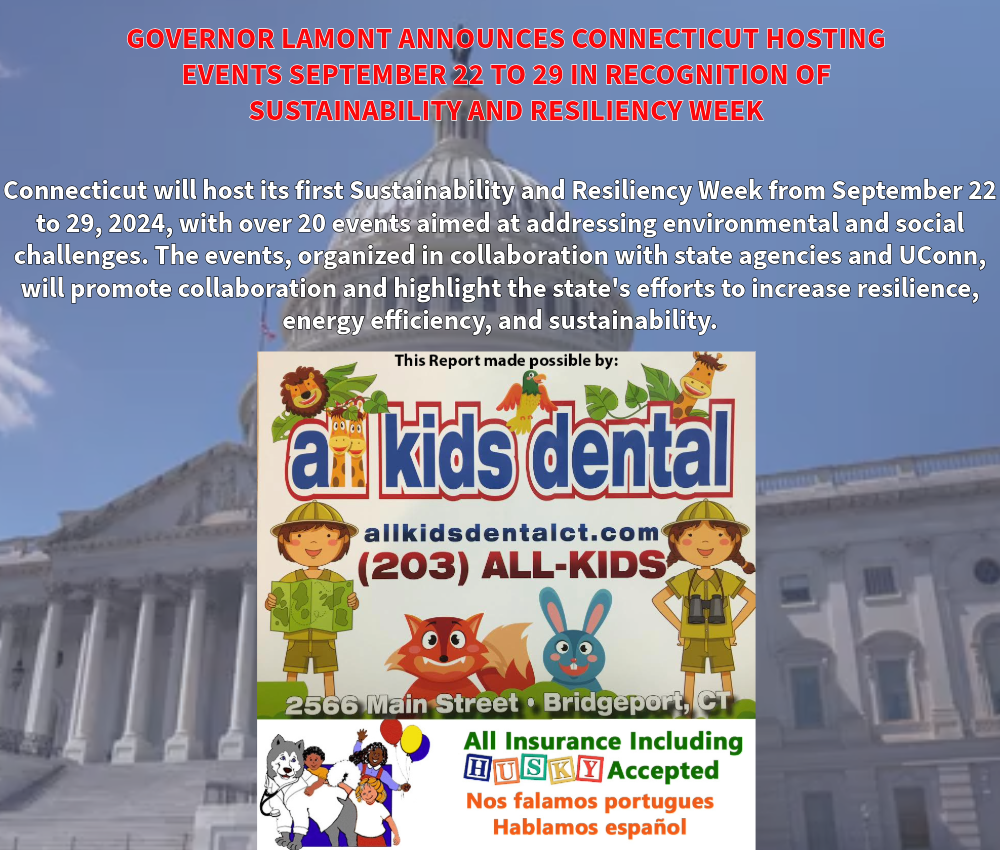For the Full Schedule and To Enroll, Visit portal.ct.gov/sustainability

(HARTFORD, CT) – Governor Ned Lamont today announced that the State of Connecticut, through a collaboration between several state agencies, UConn, and other partners, will host a series of in-person, online, and hybrid events from September 22 to 29, 2024, in recognition of its first ever Sustainability and Resiliency Week.
The initiative is designed to promote engagement, foster collaboration, and celebrate the progress and innovation being done in the state as the world faces increasingly complex environmental and social challenges. In recent years, Connecticut state government has been working to implement actions to make the state one of the most resilient in the country, such as taking steps to increase energy efficiency, reduce the state’s carbon footprint, reduce waste, and reduce the costs of government operations. The Sustainability and Resiliency Week events are being organized to encourage more collaboration among partners while also engaging the general public and external organizations in these efforts.
More than 20 events have been organized for the week, including ones related to climate resilience, nature-based solutions, water quality, transportation, energy initiatives, and more. Anyone interested in learning more about these initiatives is encouraged to participate. For the full event schedule and to enroll, visit portal.ct.gov/sustainability.
“Connecticut’s communities and natural resources are a source of great pride among Connecticut residents,” Governor Lamont said. “Protecting our resources and growing the Connecticut economy can be done together. The Sustainability and Resiliency Week events are an opportunity for residents, elected officials, educators, and advocates to come together to learn about efforts underway and identify solutions to mitigate the damaging effects of climate change and to manage our resources sustainably.”
“A top focus of the Lamont administration is facilitating sustainability and resiliency across the state, from transportation to agriculture, from public health to our electrical grid, from rural to urban communities as our natural resources are challenged by a changing climate and legacy infrastructure,” Dr. Joanna Wozniak-Brown, climate and infrastructure policy development coordinator at the Connecticut Office of Policy and Management, said. “This week will be an opportunity to bring some of these issues into greater focus, celebrate the work currently underway, and foster key relationships that will not only make this work possible, but a success.”
“Sustainability and resiliency are at the center of everything we do as a state government,” Michelle Gilman, commissioner of the Connecticut Department of Administrative Services, said. “Our department plays a critical role in these efforts on behalf of Connecticut state government – from constructing highly efficient and net-zero energy state buildings, to building out electric vehicle charging infrastructure and working toward an electrified fleet, to partnering with our sister agencies to improve the efficiency of our physical spaces. Sustainability and Resiliency Week is a great opportunity to highlight the ongoing work in this space across state government, and it is a testament to the vision of Governor Lamont and the leadership of those tasked with implementing his ambitious climate agenda.”
“Sustainability and Resiliency Week is an opportunity to highlight and enhance the public health infrastructure so that we can ensure drinking water is safe throughout our state and be better prepared for the effects of climate change,” Dr. Manisha Juthani, commissioner of the Connecticut Department of Public Health, said. “The science shows that we are experiencing severe health impacts of human-caused climate change. The effects of climate change can lead to shifts in precipitation patterns, more frost-free days, and more carbon dioxide in the atmosphere. These changes have resulted in health impacts from extreme weather and more exposure to infections like EEE, West Nile virus, and Lyme disease. We commend Governor Lamont for highlighting Sustainability and Resiliency Week and giving all Connecticut residents, especially those living in our most vulnerable communities, the opportunity to learn more about improving and maintaining their health for years to come.”
One of the highlights of the week’s events will be UConn’s second annual Sustainable Clean Energy Summit at its main campus in Storrs on Monday, September 23, which will feature a keynote address from U.S. Department of Energy Assistant Secretary for Energy Gene Rodrigues. UConn is working toward carbon neutrality on its campuses by 2030 with the goal of bring entirely carbon zero by 2040 and is serving as a living laboratory to develop and demonstrate new approaches to sustainability and energy resilience.
“Mitigating the effects of climate change, ensuring environmental equity, and providing energy security are among the greatest imperatives of our time,” UConn President Radenka Maric, an internationally recognized expert and researcher in clean energy, said. “At the same time, meeting those challenges also offers extraordinary opportunities for Connecticut to lead the nation and world in innovating and demonstrating solutions. We commend Governor Lamont and state leaders, both for designating the Sustainability and Resilience Week and for supporting UConn in the critical work underway here and elsewhere to address these issues.”
Participating Connecticut state agencies in Sustainability and Resiliency Week events include:
Office of Governor Ned Lamont
Office of Policy and Management
Department of Administrative Services
Department of Economic and Community Development
Department of Emergency Services and Public Protection
Department of Energy and Environmental Protection
Department of Public Health
Department of Transportation
Public Utilities Regulatory Authority
University of Connecticut
Anyone interested in participating in any of the events are strongly encouraged to enroll as soon as possible.
